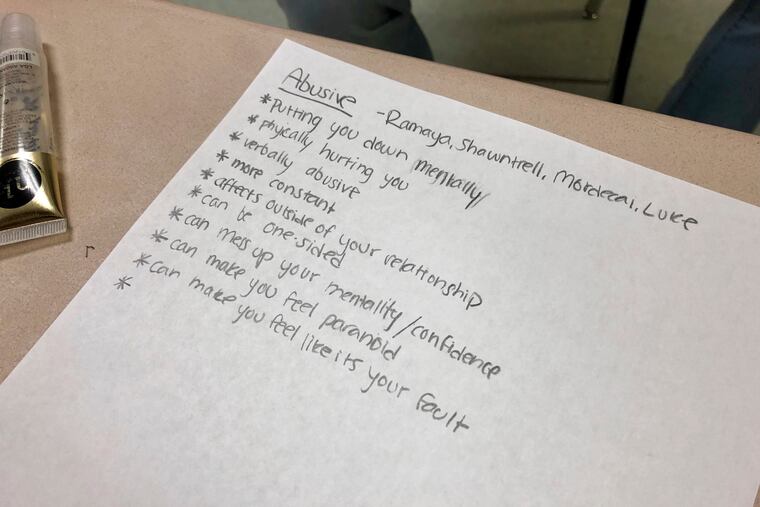Pennsylvania’s sex ed is outdated. A new bill would change that. | Opinion
House Bill 1586 can help our children and teens develop feelings of self-worth, empowerment, and strategies for forming healthy relationships.

Sad but true: In this era of #MeToo and #TimesUp and gender equity, we are still leaving school-age kids unequipped to deal with all the harassment and body-shaming they face every day, online and in person. It’s still tough for many preteens or teens to bring questions and problems to their parents, and equally so for them to learn about their sexual identities in a positive way from adults.
Fifty-plus years ago, kids like me were too embarrassed to have the birds-and-bees talk with our parents. On TV, in the movies, and in magazines, we were hit with distorted images of how our bodies should look and peer pressure to have a boyfriend or girlfriend no matter what it took. Meanwhile, schools taught anatomy and left it at that.
Today, it’s no better. In fact it’s arguably worse. Computer-savvy adolescents and teens glued to their smartphones have easy access to pornography. Whether curious or anxious to present themselves as cool, they receive and sometimes share sexually explicit texts and photos on social media. But kids often lack the information, self-esteem, and tools to navigate this world. The absence of comprehensive sex ed hits LGBTQ kids especially hard. It’s no coincidence that disturbingly high numbers of LGBTQ kids attempt suicide or drop out of school.
Now we have a chance to do right by them. A bill in Harrisburg would require comprehensive, medically accurate, age-appropriate sexuality education in Pennsylvania’s public schools. Introduced by Brian Sims, my state representative, House Bill 1586 would be a lifeline for countless children to get informed, recognize the agency of consent, and stay safe. For elementary school students, concepts such as “good touch vs. bad touch” would be introduced. For older students, curricula would include contraception methods, and help teens identify and avoid risky behaviors and harmful relationships.
At a committee hearing for HB 1586 held at Jefferson University on October 17, educators, doctors, social workers, health organization leaders, parents, and students gave testimony. Let me share some of the eye-opening facts and sound advice they delivered:
Elicia Gonzales, executive director of the Women’s Medical Fund: “For some of us, our earliest memories of our bodies and touch are painful. We recall the stares, glares, and aggression that made us believe we were less than, we were the possessions of others, our body was not our own. Do you recall feeling embarrassed because your body looked differently from your friends or classmates? Remember the feeling of not knowing how to say ‘no,’ or ‘slow down,’ or ‘I’m not ready?’Comprehensive sex ed looks like engaging in dialogue about feelings and emotions, not just plumbing and pathology.”
Carlee Warfield, a senior at Downingtown STEM Academy: “Even though my teacher never uttered the phrase ‘sex education’ once, she did mention the act of sex. During a class lecture, she declared that the only way to prevent pregnancy or STDs is through abstinence. But when she said ‘abstinence,’ she laughed. Clearly, she didn’t even believe in the curriculum.”
Lynette Medley, founder and CEO of No More Secrets Mind Body Spirit, Inc.: “Our youth are at an age of instantaneous access. The average American young person spends over seven hours a day on media devices, often using multiple systems at once. Studies show that more than 75% of prime-time TV programs contain sexual content. About half of those that use the Internet have been exposed to online porn in the last year. Are we are negligent by not having a comprehensive sexual health education component already?"
What, you say, we don’t have mandated sex ed in 2019? Nope. Our Pennsylvania legislature — like those in 20 other states — does not require sex education in schools.
Education about HIV, yes. But not education about sex. And if sex education is taught, there is nothing to keep religion out of it.
Pennsylvania need not remain at the bottom of states providing comprehensive sex ed. We can help our children and teens develop feelings of self-worth, empowerment, and strategies for forming healthy relationships. Parents, grandparents, aunts, uncles, and constituents: Tell your stories. Explain how you were handicapped or hurt because schools failed to teach sex education. Point out how you could have benefited from a sensible, sensitive sexuality curriculum. Urge our state legislators to support, cosponsor, and champion HB 1586. Let’s get it passed and do better by our youth now.
Eleanor Levie is a Storyville columnist at ChildsWorld.news, steering committee member of the Southeast Pennsylvania Early Childhood Coalition, and volunteer advocate for the National Council of Jewish Women.